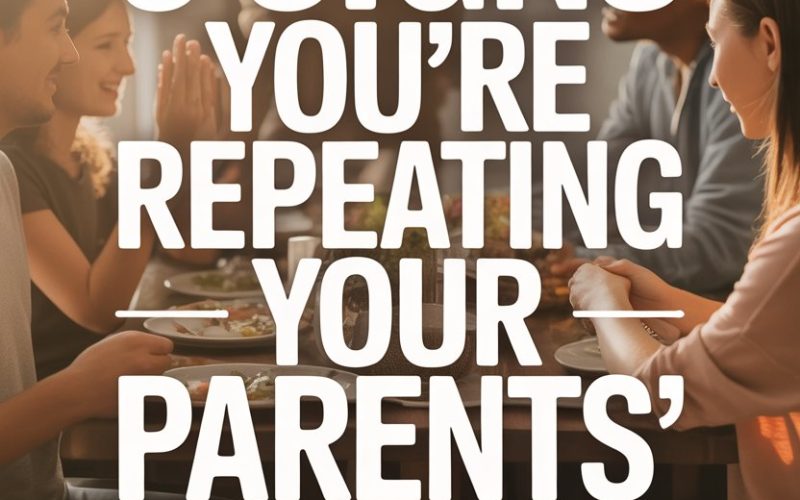Ever had that moment where your mum or dad’s voice bursts out of your own mouth—except it’s just you, squawking at your kids over wet towels on the floor?
If the answer’s yes, welcome to the club.
It’s embarrassingly easy to recycle the old family routine, even when you swore you’d do things differently.
Old patterns can sneak in during the bedtime rush, the school run, or when you’re staring down a small human refusing anything green. Still, catching yourself in the act is half the battle.
Let’s look at five classic signs you’ve got a bit too much déjà vu going on—and what you can do about it.
1. You Swore You’d Never Yell… But Here You Are
Growing up, perhaps your parents’ go-to solution for discipline was a decibel-raising contest. You promised yourself your house would be a shout-free sanctuary.
Fast forward, and now your own vocal cords are doing an uncanny impression of your dad at full volume.
Nobody aims to become the family foghorn. Yet, when exhaustion meets chaos, old coping mechanisms sneak out.
A University of Pittsburgh study shows that frequent yelling can harm kids in ways similar to physical punishment—raising anxiety, boosting aggression, and sowing seeds for the cycle to repeat.
If you’re mortified by your own outbursts, try this rescue move: change your physical location. Stepping out of the room, even for just thirty seconds, can help reset your tone.
Revisit your expectations too. Children’s brains aren’t wired for logic when emotions run high, so shouting rarely helps.
Whisper instead—it’s oddly effective. If you’re feeling creative (or desperate), try singing instructions. It’s almost impossible to yell when you’re channeling your inner Beyoncé.
2. “Because I Said So” Is Your Favourite Parenting Mantra
Did your parents ever shut down your questions with a curt “Because I said so”?
If you find those same words tumbling out when your little one asks why shoes belong on feet (and not in the fridge), you’ve inherited the classic conversation-ender.
Research from Harvard’s Center on the Developing Child highlights the power of back-and-forth dialogue—so-called “serve and return”—in building children’s brains.
Shutting things down with a flat directive misses those vital learning moments.
Instead, try “What do you think?” or “Let’s figure it out together.” Yes, this approach takes more patience—possibly super-human levels.
But it shows your child their curiosity matters, and it teaches them to reason. Bonus: you might get some hilarious answers about why spaghetti shouldn’t go in one’s hair.
3. Emotional Blackmail Sneaks Into Your Toolbox
Remember when you were guilt-tripped with lines like, “After all I’ve done for you!” or “You’ll break my heart if you don’t hug Gran”?
Emotional blackmail, even in its tamest form, is a vintage parenting tool best left in the attic.
It’s easy to slip into without noticing, especially when you’re desperate for cooperation or affection. Unintentional guilt trips can teach children to ignore their own feelings just to keep someone else happy. Not ideal, right?
Parenting specialists at A Fine Parent recommend swapping guilt-laden statements for honest communication. Instead of “You’re making mummy sad by not eating your peas,” try, “I’d love it if you tried a bite, but it’s your choice.”
When emotions bubble up, own them: “I’m feeling disappointed right now, and that’s not your fault.” Kids learn empathy by watching us handle big feelings with grace—not by being cast as the villain in a dinner-time drama.
4. Keeping Feelings Off-Limits
Was your family motto something like “No tears at the table” or “Big boys don’t cry”? If you catch yourself telling your children to “calm down” or “stop being so sensitive,” you might be channeling your own upbringing’s emotional rules.
Bottling things up doesn’t make feelings disappear. Instead, it teaches kids to hide emotions—until they resurface as teenaged eye rolls or adult-sized meltdowns.
According to the Raising Children Network, youngsters who feel safe expressing emotions grow up with stronger relationships and better mental health.
Try this tonight: name your children’s emotions for them, even if they’re being irrational (“You’re upset because your toast broke in half—it’s okay to feel that way”). Model what it looks like to sit with big feelings. And if you grew up with emotional lockdown, give yourself a bit of breathing space to practice, too.
5. Expecting Perfection—From Them or Yourself
Did your parents keep a running tally of academic achievements, sports medals, or perfectly ironed uniforms?
Perhaps you’re now cheerleading (okay, nagging) your own kids to “do better,” or berating yourself for not being the Pinterest parent you see online.
The perfection trap is sneaky. Not only does it ramp up anxiety for kids (and for you), it also squashes the joy out of learning.
Experts at the Child Mind Institute emphasise that children need the freedom to mess up, learn, and try again—without the weight of a million expectations.
What helps? Celebrate effort, not just results. Try replacing “Good job on your A+” with “I can tell you worked so hard on that project.”
And if you flub something—burned dinner, forgot a meeting, lost your cool—say so out loud. Admitting mistakes shows your kids that it’s normal (not catastrophic) when things go sideways.
Old Habits, New Choices
We all carry echoes of our parents in our parenting—a dash of nostalgia, a sprinkle of old wounds, sometimes a recurring nightmare involving a wooden spoon. The trick is noticing when historic patterns are running the show, then making small, conscious shifts.
Change won’t happen overnight, and nobody expects you to morph into Mary Poppins by the weekend.
But every time you choose a calmer response, offer a listening ear, or let your child see you make (and fix) a mistake, you’re quietly rewriting the family script.
You and your kids are learning together. A little self-compassion, some honest chats, and the occasional whispered instruction can go a long way.
After all, it’s not about being perfect—it’s about being just a little bit better than yesterday.
And if you accidentally sound exactly like your mum next time you ask someone to pick up their socks? Well, welcome to the tradition.




